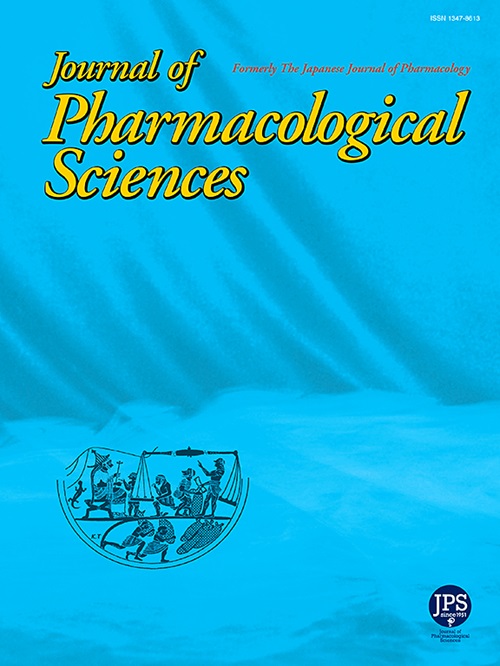Rho kinase 2 promotes epithelial-mesenchymal transition and proliferation in human prostate cancer PC-3 cells
IF 2.9
3区 医学
Q2 PHARMACOLOGY & PHARMACY
引用次数: 0
Abstract
Prostate cancer is the second most common cancer in men. Although androgen deprivation therapy is initially effective, resistance inevitably develops. Most patients eventually progress to castration-resistant prostate cancer, a stage with limited treatment options and poor prognosis. Rho kinases (ROCK1 and ROCK2) have been implicated in cancer progression, but their therapeutic targeting remains limited. This study examined the pathological roles of ROCK1 and ROCK2 in epithelial-mesenchymal transition (EMT) and proliferation of prostate cancer cells. ROCK1 expression was comparable between human prostate epithelial cells (PrECs) and androgen-independent prostate cancer cells, PC-3 and DU145. In contrast, ROCK2 expression was higher in PC-3 cells than in PrECs and DU145 cells. EMT marker analysis revealed that PC-3 cells exhibited decreased E-cadherin and increased N-cadherin and Snail expression. ROCK2 knockdown reversed this EMT phenotype, reducing cell proliferation, migration, 3D tumor spheroid formation, and spheroid cell viability. Similar inhibitory effects were observed by the ROCK2-selective blocker KD025 (IC50 = 422 nM). Furthermore, ROCK2 deficiency attenuated the tumor growth of PC-3 cells in a xenograft mouse model. These findings indicate that ROCK2 promotes EMT process and tumor progression in PC-3 cells. Targeting ROCK2 may represent a promising therapeutic strategy for androgen-independent prostate cancer.
Rho激酶2促进人前列腺癌PC-3细胞上皮间质转化和增殖
前列腺癌是男性中第二常见的癌症。虽然雄激素剥夺疗法最初是有效的,但不可避免地会产生耐药性。大多数患者最终发展为去势抵抗性前列腺癌,这一阶段的治疗选择有限,预后较差。Rho激酶(ROCK1和ROCK2)与癌症进展有关,但其治疗靶点仍然有限。本研究探讨了ROCK1和ROCK2在前列腺癌细胞上皮-间质转化(epithelial-mesenchymal transition, EMT)和增殖中的病理作用。ROCK1的表达在人前列腺上皮细胞(PrECs)和雄激素非依赖性前列腺癌细胞PC-3和DU145之间具有可同性。ROCK2在PC-3细胞中的表达高于PrECs和DU145细胞。EMT标记分析显示PC-3细胞E-cadherin表达减少,N-cadherin和Snail表达增加。ROCK2敲低逆转了这种EMT表型,减少了细胞增殖、迁移、3D肿瘤球状体形成和球状细胞活力。rock2选择性阻断剂KD025也有类似的抑制作用(IC50 = 422 nM)。此外,在异种移植小鼠模型中,ROCK2缺乏可减弱PC-3细胞的肿瘤生长。这些发现表明ROCK2促进了PC-3细胞的EMT过程和肿瘤进展。靶向ROCK2可能是治疗雄激素非依赖性前列腺癌的一种有希望的治疗策略。
本文章由计算机程序翻译,如有差异,请以英文原文为准。
求助全文
约1分钟内获得全文
求助全文
来源期刊
CiteScore
6.20
自引率
2.90%
发文量
104
审稿时长
31 days
期刊介绍:
Journal of Pharmacological Sciences (JPS) is an international open access journal intended for the advancement of pharmacological sciences in the world. The Journal welcomes submissions in all fields of experimental and clinical pharmacology, including neuroscience, and biochemical, cellular, and molecular pharmacology for publication as Reviews, Full Papers or Short Communications. Short Communications are short research article intended to provide novel and exciting pharmacological findings. Manuscripts concerning descriptive case reports, pharmacokinetic and pharmacodynamic studies without pharmacological mechanism and dose-response determinations are not acceptable and will be rejected without peer review. The ethnopharmacological studies are also out of the scope of this journal. Furthermore, JPS does not publish work on the actions of biological extracts unknown chemical composition.

 求助内容:
求助内容: 应助结果提醒方式:
应助结果提醒方式:


